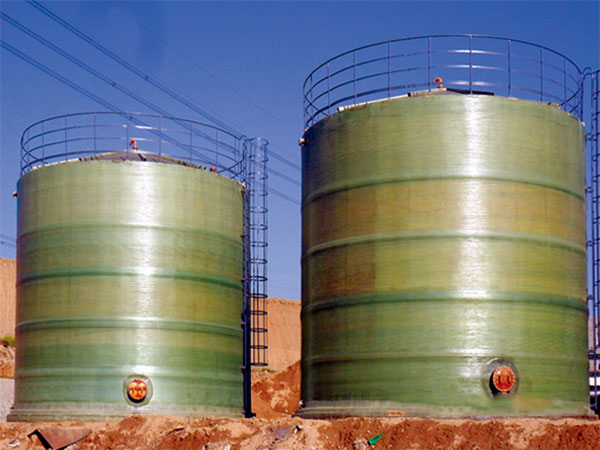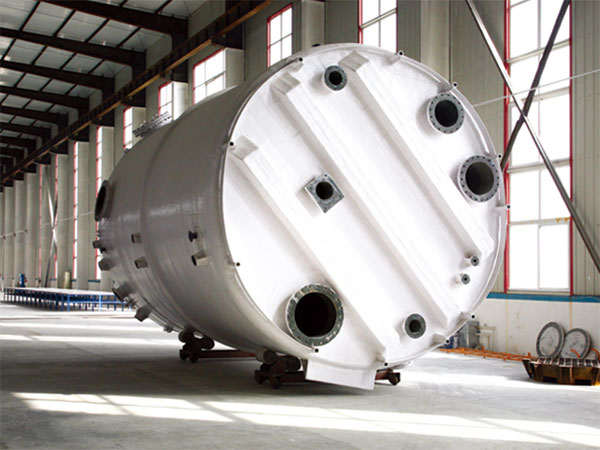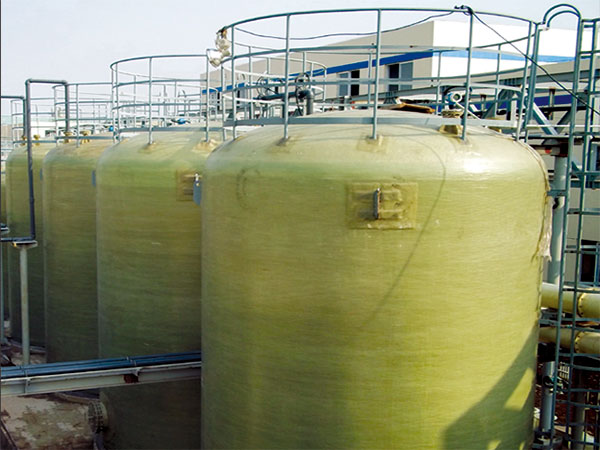
FRP container is a kind of container made of composite material with glass fiber as reinforcement and resin as adhesive, which has the advantages of light weight, high strength, corrosion resistance and impact resistance. Its manufacturing process usually uses winding molding technology, which is wound by microcomputer-controlled machine, and can be designed into containers of different shapes and sizes according to specific needs.

1.Lightweight and high strength
The density of FRP is usually 1.8~2.1g/cm³, which is only 1/4~1/5 of steel. It has higher specific strength than steel, cast iron and plastic. Its mechanical strength can reach or exceed the level of ordinary carbon steel, and the tensile and bending strength of some epoxy and unsaturated polyester FRP can even reach more than 400MPa.The density of FRP is usually 1.8~2.1g/cm³, which is only 1/4~1/5 of steel. It has higher specific strength than steel, cast iron and plastic. Its mechanical strength can reach or exceed the level of ordinary carbon steel, and the tensile and bending strength of some epoxy and unsaturated polyester FRP can even reach more than 400MPa.
2.Chemical corrosion resistance
FRP has excellent chemical resistance and can resist corrosion from a variety of acids, alkalis, salts and organic solvents. This property makes it perform well when storing corrosive media, even better than stainless steel.
3.Excellent electrical insulation
FRP is non-conductive and has good electrical insulation properties. It is suitable for manufacturing insulating parts, such as insulating parts in motors, electrical appliances and instruments.
4.Excellent thermal performance
The thermal expansion coefficient of FRP is equivalent to that of steel, and the thermal conductivity coefficient is only 0.5% of steel, so it is an excellent thermal and electrical insulation material.

5.Design flexibility
The design of fiberglass containers can be flexibly adjusted according to specific needs by changing parameters such as structural layer thickness, winding angle and wall thickness to meet the requirements of different pressure levels and working conditions. This design flexibility makes it widely used in chemical, petroleum, food, pharmaceutical and other fields.
6.Long service life
The service life of FRP containers is much longer than that of steel pipes and even longer than that of stainless steel. The anti-corrosion effect is affected by factors such as materials, lubricants, media, usage conditions, wall thickness, structure and temperature.
7.Environmental protection and energy saving
Fiberglass containers do not need to be transported during the manufacturing process, are easy to install, and do not require anti-corrosion coatings, reducing environmental pollution and resource waste.

FRP containers are widely used in many fields due to their excellent corrosion resistance, light weight and high strength, insulation and environmental protection properties.
1.Chemical Industry: FRP containers are widely used in the chemical industry to store and transport various corrosive chemicals such as hydrochloric acid, sulfuric acid, nitric acid, organic acids, fluorosilicic acid, hydrofluoric acid, etc. In addition, they are also used for the storage and handling of chemical raw materials to reduce the risk of pollution and waste.
2.Oil and gas industry: FRP containers are suitable for storing oil, natural gas and their derivatives. They can hold up high pressure and temperature and have good corrosion resistance.
3.Food and Beverage Industry: FRP containers are widely used in the storage, mixing and transportation of food and beverages due to their non-toxic and corrosion-resistant properties, such as soy sauce tanks, vinegar tanks, wine tanks, etc. In addition, they are also used in the fields of brewing and beverage processing.
4.Environmental protection projects: FRP containers are used as sedimentation tanks, regulating tanks, digestion tanks and other equipment in sewage treatment plants to effectively prevent corrosion and leakage problems.
5.Construction and municipal engineering: FRP containers are used to store and treat water and sewage, and as storage tanks for water supply and drainage systems, with corrosion resistance and sealing properties.
6.Pharmaceutical Industry: FRP containers are used to store high-purity items such as medicines and vaccines, and are favored for their non-toxicity and corrosion resistance.
7.Other fields: FRP containers are also used in textile, electric power, artificial synthesis, water supply and drainage, seawater desalination, irrigation, national defense engineering and other industries to meet the needs of different media and working conditions.
Tel:+86-318-8611217
E-mail:info@kntcomposites.com
Address:Jizhou District, Hengshui City, Hebei Province, China